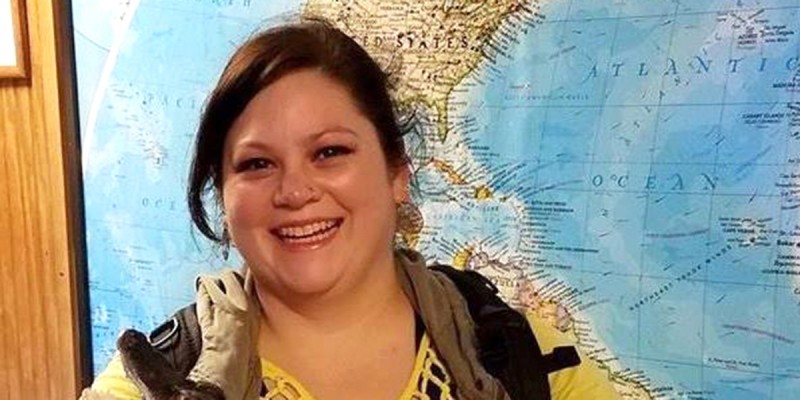Interdisciplinary Binghamton education sets alum on a career path

When Jessica Gorman, MS ‘20, came to Binghamton University, she wanted to further her passion for the environment and for educating others.
Before coming to Binghamton for her Master of Science in Sustainable Communities, Gorman received her bachelor’s degree in conservation biology from the SUNY College of Environmental Science and Forestry. When considering graduate programs, Binghamton University’s multifaceted approach to environmentalism attracted her.
“I saw that Binghamton had an interdisciplinary program, and that drew me to it,” Gorman said. “It had the aspects of science that I liked, but it didn’t ignore the policy side of things or the human dimensions.”
During her time at the University, Gorman took classes with George Meindl, an instructor in the Environmental Studies Program, where she participated in projects that furthered her passion for the field.
Some of her classes, such as Meindl’s ENVI 413 Envi Impact Statements, were designated as community-engaged learning courses by the Center for Civic Engagement (CCE), which aids and supports faculty by providing programs, tools and resources for instructors to incorporate community engagement into their teaching, research or scholarship.
In ENVI 413, students complete a semester-long community-based project in which they use their knowledge of sustainability and contemporary environmental issues to help local organizations and businesses, such as consulting firms, nonprofit organizations, local government and more, while also gaining professional experience.
“The ENVI 413 capstone project is an opportunity for students to make an impact — addressing a real-world environmental problem by integrating their coursework in an original, interdisciplinary project,” Meindl said. “Capstones allow students to apply and hone the skills they have learned throughout their Binghamton University career in an experiential or field-based academic experience similar to positions they might apply for after graduation. The projects are intentionally team based and provide an opportunity for students to bring their individual skill sets to the group effort.”
Gorman and her group chose to focus on the Binghamton University Nature Preserve for their project.
“The course was a hands-on, semester-long project, so it definitely improved my skill set and made me more confident in my job search,” Gorman said. “Meindl had the graduate students in groups with undergraduate students who were the lead on the project. This allowed me to build up my leadership skills, as I did not have a lot of leadership experience. My group interviewed visitors to the Nature Preserve on their attitudes toward nature and how they used the preserve. This is something that can help me as an environmental educator because understanding your audience and its attitudes helps tailor educational content to reach the most people.”
When the project was over, Gorman and her group gave the information they collected to Dylan Horvath, the steward of natural areas at the University. Now the University has data on who uses the Nature Preserve, as well as what their attitudes toward conservation and preservation are.
Gorman currently works at the Ross Park Zoo in Binghamton as a sustainability coordinator. The first person to ever fill this position at the zoo, she has a multifaceted role involving her in a variety of tasks, from creating educational displays on conservation to overseeing the zoo’s new composting program.
“I was promoted recently, and now I’m going to be a lot more involved in the conservation and education side of things as well,” Gorman said. “I’ll be planning educational programs. Throughout the winter we’re going to be open on weekends, so we’re going to try to put on events for the public.”
Throughout her career as a student and a professional, Gorman has actively worked to better her local community, from Binghamton to her hometown of Syracuse, according to Meindl.
“Immediately after working with Jessica, it was clear to me that she wanted her work to positively impact the broader community,” Meindl said. “She is thoughtful, caring, hard-working and considerate of how her actions impact others. She has actively pursued positions that allow her to engage with her community, including past positions working at nature centers to her current position at the Ross Park Zoo.”
Gorman credits her time at Binghamton with landing her the job she has now, saying that her experiences in and outside of the classroom prepared her for the work she does as a sustainability coordinator.
“My education in sustainable communities at Binghamton helped me get this position,” Gorman said. “The zoo is coming from just a conservation perspective. But the program at Binghamton included equity and the economics part of sustainability and not just the environment. I gained other perspectives and lenses and was able to bring that expertise to the zoo.”
